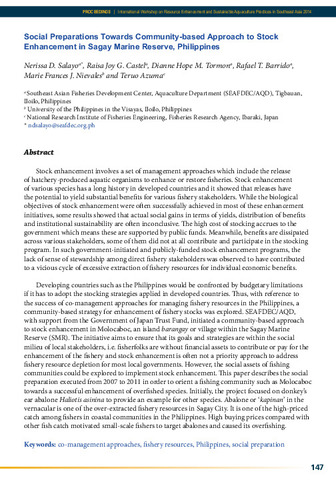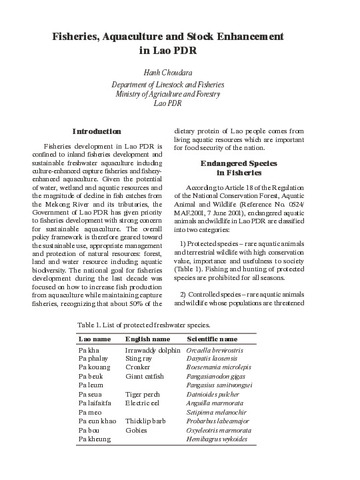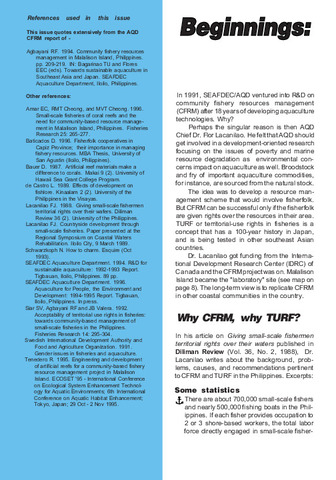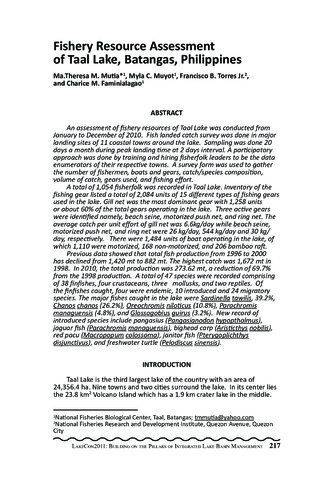Social preparations towards community-based approach to stock enhancement in Sagay Marine Reserve, Philippines
- Global styles
- MLA
- Vancouver
- Elsevier - Harvard
- APA
- Help
Share
抄録
Stock enhancement involves a set of management approaches which include the release of hatchery-produced aquatic organisms to enhance or restore fisheries. Stock enhancement of various species has a long history in developed countries and it showed that releases have the potential to yield substantial benefits for various fishery stakeholders. While the biological objectives of stock enhancement were often successfully achieved in most of these enhancement initiatives, some results showed that actual social gains in terms of yields, distribution of benefits and institutional sustainability are often inconclusive. The high cost of stocking accrues to the government which means these are supported by public funds. Meanwhile, benefits are dissipated across various stakeholders, some of them did not at all contribute and participate in the stocking program. In such government-initiated and publicly-funded stock enhancement programs, the lack of sense of stewardship among direct fishery stakeholders was observed to have contributed to a vicious cycle of excessive extraction of fishery resources for individual economic benefits.
Developing countries such as the Philippines would be confronted by budgetary limitations if it has to adopt the stocking strategies applied in developed countries. Thus, with reference to the success of co-management approaches for managing fishery resources in the Philippines, a community-based strategy for enhancement of fishery stocks was explored. SEAFDEC/AQD, with support from the Government of Japan Trust Fund, initiated a community-based approach to stock enhancement in Molocaboc, an island barangay or village within the Sagay Marine Reserve (SMR). The initiative aims to ensure that its goals and strategies are within the social milieu of local stakeholders, i.e. fisherfolks are without financial assets to contribute or pay for the enhancement of the fishery and stock enhancement is often not a priority approach to address fishery resource depletion for most local governments. However, the social assets of fishing communities could be explored to implement stock enhancement. This paper describes the social preparation executed from 2007 to 2011 in order to orient a fishing community such as Molocaboc towards a successful enhancement of overfished species. Initially, the project focused on donkey s ear abalone Haliotis asinina to provide an example for other species. Abalone or kapinan in the vernacular is one of the over-extracted fishery resources in Sagay City. It is one of the high-priced catch among fishers in coastal communities in the Philippines. High buying prices compared with other fish catch motivated small-scale fishers to target abalones and caused its overfishing.
Suggested Citation
Salayo, N. D., Castel, R. J. G., Tormon, D. H. M., Barrido, R. T., Nievales, M. F. J., & Azuma, T. (2015). Social preparations towards community-based approach to stock enhancement in Sagay Marine Reserve, Philippines. In M. R. R. Romana-Eguia, F. D. Parado-Estepa, N. D. Salayo, & M. J. H. Lebata-Ramos (Eds.), Resource Enhancement and Sustainable Aquaculture Practices in Southeast Asia: Challenges in Responsible Production of Aquatic Species: Proceedings of the International Workshop on Resource Enhancement and Sustainable Aquaculture Practices in Southeast Asia 2014 (RESA) (pp. 147-158). Tigbauan, Iloilo, Philippines: Aquaculture Dept., Southeast Asian Fisheries Development Center.
Type
Conference paperISBN
9789719931041
Related items
Showing items related by title, author, creator and subject.
-
Fisheries, aquaculture and stock enhancement in Lao PDR
Choudara, Hanh (Aquaculture Department, Southeast Asian Fisheries Development Center, 2006)Fisheries development in Lao PDR is confined to inland fisheries development and sustainable freshwater aquaculture including culture-enhanced capture fisheries and fishery-enhanced aquaculture. Given the potential of ... -
Beginnings: SEAFDEC/AQD, CFRM, and Malalison Island
Southeast Asian Fisheries Development Center, Aquaculture Department (Aquaculture Department, Southeast Asian Fisheries Development Center, 1996)The paper documents the community fishery resources management activities of Southeast Asian Fisheries Development Center, Aquaculture Department (SEAFDEC/AQD) in Malalison Island, Antique, Philippines. -
Series: Summary of Proceedings No. 1/2013;
Fishery resource assessment of Taal Lake, Batangas, Philippines
Mutia, Ma. Theresa M.; Muyot, Myla C.; Torres Jr., Francisco B.; Faminialagao, Charice M. (PCAARRD-DOST, 2013)An assessment of fishery resources of Taal Lake was conducted from January to December of 2010. Fish landed catch survey was done in major landing sites of 11 coastal towns around the lake. Sampling was done 20 days a month ...






